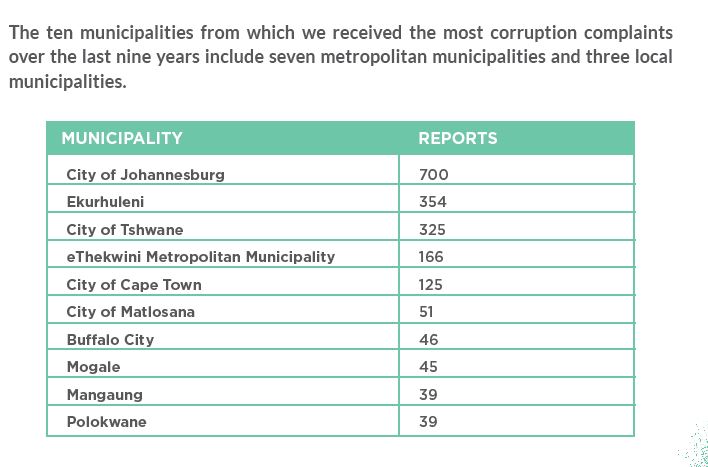Johannesburg – Corruption Watch released a report today which shows the corruption issues that have plagued municipalities in the country for almost 10 years, with 5000 whistleblowers reporting cases of corruption in South Africa.
As autonomous institutions, municipalities are mandated to adhere to principles of accountability, democracy and good governance, manifested through providing basic services, cultivating safe and healthy environments, and encouraging community members and organisations to participate in municipal processes and programmes.
They are directly responsible for ensuring that communities have water and sanitation, electricity, developed and maintained infrastructure, and that community members have a voice in decisions that affect their lives.
In its nine years of existence Corruption Watch said it has received almost 33 000 whistle-blower reports, 16% of which represent allegations of local government corruption.
These corruption reports expose the inadequacies of local government structures that fail to deliver basic services to their own communities.
“What is evident in the majority of corruption cases relating to local governance is that South Africa, broadly, has a leadership crisis,” said Melusi Ncala, CW researcher and author of the report.
“Consequently, the hedges of the country’s democracy are unprotected because politicians and administrators alike are serving personal, factional and private interests. Not even a global pandemic could make them pause and think about the people they promised to serve. During their frenzy, the hardships experienced by the elderly, unemployed youth, the impoverished men and women, were compounded due to a lack of basic service delivery,” added Ncala.
In the report titled, South Africa Needs Clean Hands, it provides an understanding of how corruption manifests at the local level, including the extent to which some municipalities have been captured to serve private interests, and are impacted by rampant abuse of power and resources.
In so doing, it seeks to assist the public in making informed decisions in selecting local government representatives at election time, and calling for increased transparency and accountability.
The brunt of these corrupt activities is most severely felt by vulnerable communities who are denied access to their basic human rights and services as a result.
Some of the details revealed in the report:
The highest number of allegations of corruption in local government – a record number of 857 – were received in 2020.
There was also a 50% increase in cases stemming from the Eastern Cape, Free State, KwaZulu-Natal and the Western Cape, compared to the previous year.
The municipalities most implicated in corruption-related reports constitute major metropolitan municipalities – City of Johannesburg tops the list with 700 reports, while Ekurhuleni comes in at 354, City of Tshwane at 325, eThekwini with 166, and City of Cape Town at 125 reports.

Analysis of CW’s reports show that bribery is the most common form of corruption at a local level, followed by procurement and employment irregularities, abuse of power and embezzlement of funds.

The report also revealed that most corruption occurs within the office of the municipal manager, representing 34% of all reports received.
The local/metro police are implicated in 30% of the reports, followed by housing and human settlements (10%).
These represent the top three hotspots for corruption in local government, according to the report.
The most prevalent types of corruption taking place within the office of the municipal manager include irregularities in the procurement process, embezzlement of funds, and employment irregularities, all of which have a direct link to service delivery.

Reports also point to nepotism, bribery, and disregard for policies and laws, with implicated officials rarely being held accountable.
There are several instances of companies billing double for services, such as in the City of Cape Town, or allegations of business syndicates with major influence over municipal processes.
This report gives credence to the Auditor-General of South Africa’s (AGSA) findings that the eight metropolitan municipalities, 44 district municipalities and estimated 200 local municipalities are in the main poorly managed. The latest estimated figure from AGSA for irregular expenditure is a staggering R32-billion.
The result of corruption happening within this sphere of government is that once again, the most vulnerable are left destitute or fending for themselves, and are again denied their socio-economic rights, in spite of repeated political promises for improved service delivery.
Corruption Watch commends the brave whistle-blowers who chose to expose the self-serving and corrupt actions of people entrusted with municipal duties, thereby highlighting the injustices brought about by such unacceptable abuse of power.
“Now yet again South Africans will be heading to the polls. Part of the task of electing new leadership has been simplified by the troubling whistle-blower stories documented in this report. The electorate’s remaining duty is to identify, in their own communities, persons with integrity and who are ethical and socially conscience, and elect them to office,” Ncala further stated.
Also read:
Grieving granny tells of amapiano king Mpura’s last wish
Covid-19 positive cases hit ‘Generations: The Legacy’
Max Lichaba hits out at step son
Khanyi’s boyfriend accused of being part of vehicle scam
The Braai Show producers demand an apology from AKA
Lwandle Ndaba explains why he released song about stepdad Max Lichaba
Follow @SundayWorldZA on Twitter and @sundayworldza on Instagram, or like our Facebook Page, Sunday World, by clicking here for the latest breaking news in South Africa. To Subscribe to Sunday World, click here.
Sunday World


